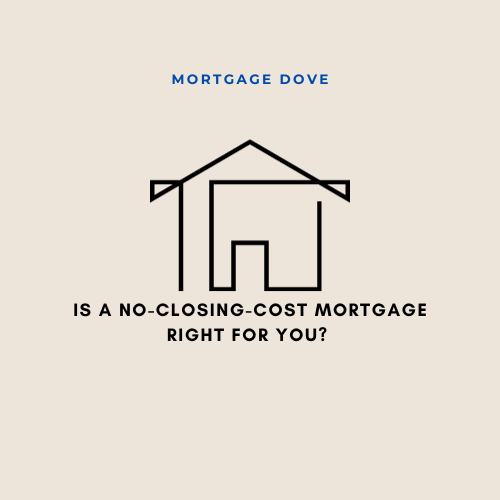
Mortgage Dove
Is a No-Closing-Cost Mortgage Right for You?
When you buy a home or refinance your mortgage, you have to pay closing costs. But you can consider a no-closing-cost mortgage if you don't have the cash to pay them upfront. This type of mortgage adds the closing costs to your loan balance or increases your interest rate, so you don't have to pay anything out of pocket when you close on your home. This may sound like a great option, but it's essential to understand the pros and cons before deciding if it's the right choice. In this type of mortgage, you'll end up paying more in the long run, so it's important to weigh the costs and benefits before making a decision. If you're planning to buy a house, you should know that there are different costs and fees that you have to pay, which are called closing costs. These costs can be significant and add up quickly. However, an option called a no-closing-cost mortgage can help you with these fees. This means that the lender will pay for these fees upfront, but they'll charge you a higher interest rate over the life of the loan. This way, you won't have to worry about upfront costs when buying a home, but you'll end up paying more in interest over time. There are some additional costs that you might need to pay apart from the price of the house itself. These costs are called closing costs and can range from 3% to 6% of the home's price. But don't worry, your lender will give you an estimate of these costs in advance. You will also know the exact amount of these costs at least three business days before you close on your mortgage. Some of the closing costs can include the following: There may also be additional fees depending on your specific situation. It's important to keep these costs in mind when planning your budget for the home purchase. A no-closing-cost mortgage may sound like a great deal, but here's what you need to know. Although it might seem like you won't have to pay any closing costs, the truth is that the lender will find a way to charge you for everything eventually. In this case, the lender will add the closing costs to your monthly payments with interest for the entire duration of your mortgage. While this may make it easier for you to buy a home without having to put as much money down upfront, the amount you will pay over time will end up being similar to a traditional mortgage or even more. In fact, you might end up paying more because the increase in interest is usually greater than the initial savings you got from avoiding the upfront closing costs. There's another catch, too. Lenders might add a prepayment penalty to the loan, which means that if you refinance your mortgage before they've recouped their costs, you'll have to pay an additional fee. It's important to do the math and see what works best for you, but in most cases, paying your closing costs upfront is the better option. First and foremost, this type of mortgage has its pros and cons, and it's not for everyone. If you plan to live in the house for a long time, say more than ten years, then it might not be the best option. However, if you're buying a starter home or planning a temporary move, then it could be a good fit. Likewise, if you're short of cash and cannot afford a significant upfront payment, it could work for you. But before you decide, consider how long you plan to stay in the house and how much cash you have on hand. These factors play a crucial role in determining whether a no-closing-cost mortgage is right for you or not. Most lenders offer no-closing-cost mortgages, but it's important to shop around and find the right one for you. When comparing lenders, make sure you understand all the costs and options that come with each offer. You can use a mortgage calculator to help you estimate and compare the total costs of both traditional and no-closing-cost mortgages. If you're working with a mortgage broker, they may be able to help you find a lender with lower fees or one that rolls the closing costs into the principal without increasing the interest rate. Keep in mind that you'll still pay more in interest with a no-closing-cost mortgage because the principal will be larger, but it won't be as much of a burden. In conclusion, a no-closing-cost mortgage can be a great option for those who are short on cash and cannot afford to pay the closing costs upfront. However, it's important to weigh the costs and benefits before making a decision. While this type of mortgage may seem like a good deal, it can end up costing you more in the long run due to the higher interest rates and other fees involved. Therefore, it's important to do your research, consult with your lender, and choose the option that works best for your specific situation.No-Closing-Cost Mortgage Defined
How Much Mortgage Closing Costs
How No-Closing-Cost Mortgage Works
The Pros and Cons of A No-Closing-Cost Mortgage
Pros
Cons
Determining Whether A No-Closing-Cost Mortgage Is The Best Option For You
How To Find No-Closing-Cost Mortgages
Bottom Line
"Mortgage Dove makes home financing convenient for every American. You can count on us to provide a home buying experience tailored to your personal needs and financial situation. We strive to give you the peace of mind that your home financing goals can be achieved.”

Mortgage®
www.mortgagedove.com



-and-how-does-it-work.png)